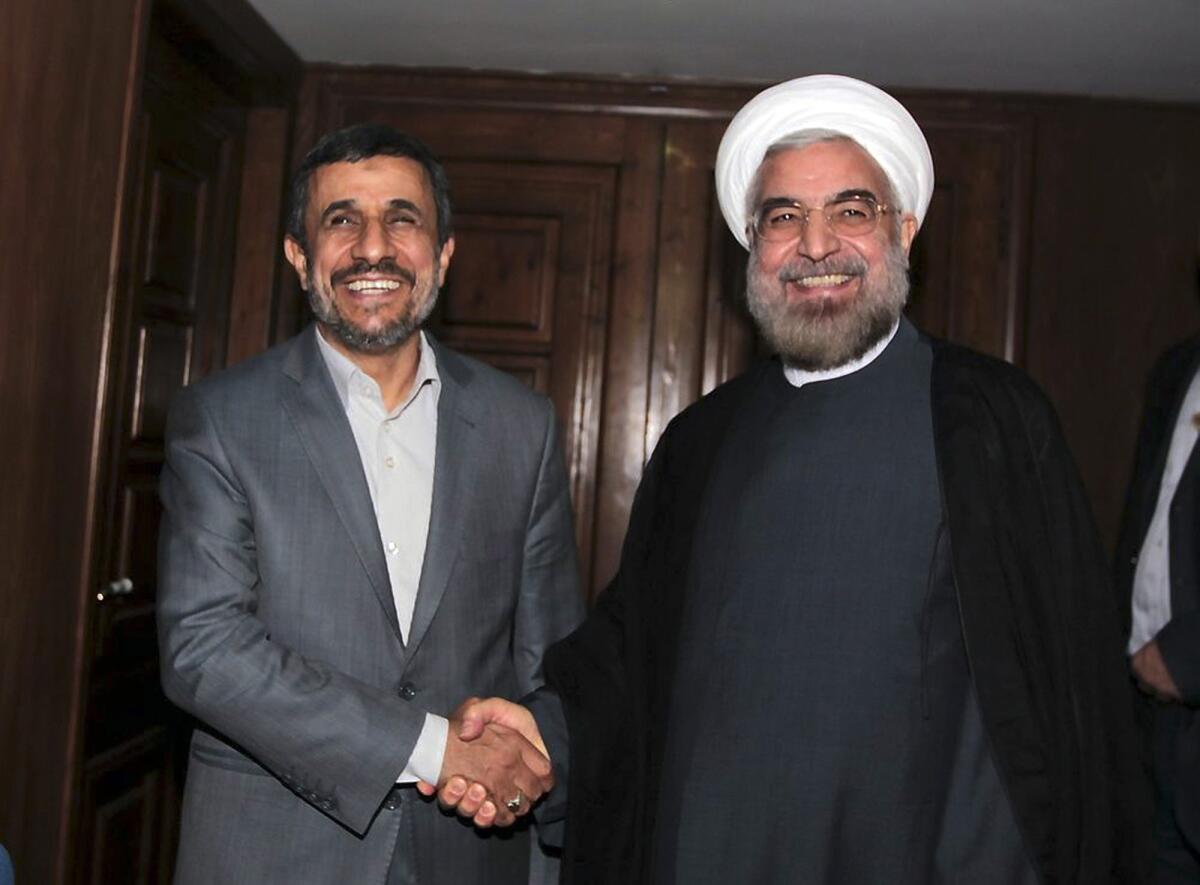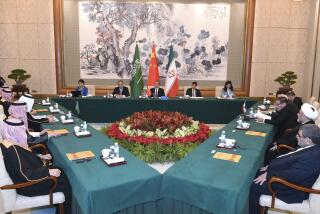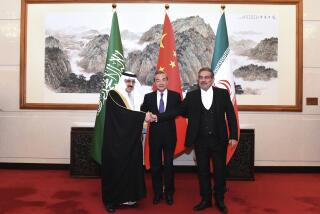McManus: Chance for a new approach on Iran

We don’t know yet whether Hassan Rowhani, the surprise winner of Iran’s presidential election, will turn out to be a reformer or just another frontman for the clerical establishment. He won’t even be inaugurated until Aug. 4.
In his post-election news conference last week, Rowhani said all the right things. Iran needs “moderation,” not extremism, he said. It’s time to “repair the wound” of Iran’s bitter history with the United States. And, he added, Iran is ready and willing to make its nuclear program “more transparent” than it is today.
But Rowhani is no democrat. He has worked directly for the uncompromising supreme leader, Ayatollah Ali Khamenei, for decades. And if there is to be a nuclear deal, it will be Khamenei who counts, not Rowhani.
INSIDE SYRIA: More Times coverage
Still, it’s in the interest of the United States — and everyone else — to give Rowhani a chance. It’s just possible that after years of increasingly harsh economic sanctions, even Khamenei is willing to consider a compromise. After all, that’s what Rowhani campaigned for — and Khamenei, who disqualified other candidates, allowed him to win.
So here are five things President Obama can do to make it easier for Rowhani to agree to a deal:
• Maintain the economic sanctions that are in place, but stop Congress from imposing new ones. Obama and his aides believe the sanctions helped Rowhani win the election. But the House of Representatives is considering a new sanctions law that would effectively place an embargo on Iran’s remaining oil exports; that would look to many Iranians like an attempt to undermine Rowhani and could alienate other countries that have supported sanctions as well. “That would be a deal breaker,” warned Charles A. Kupchan, a former Clinton administration official now at the Council on Foreign Relations.
• Go slow on enforcing new sanctions scheduled for July 1, including an embargo on supplies for Iran’s automotive industry. “If talks can be restarted, we ought to hold on to those for a while,” suggested Thomas R. Pickering, a former U.S. ambassador to the United Nations. “They can always be enforced later.” A senior U.S. official said that tactic was under consideration. “We will look at Iran’s actions, and act accordingly,” the official said.
• Sweeten the interim nuclear deal that’s on the table. In February, the United States and its allies offered to lift a few minor sanctions if Iran stopped enriching uranium to the 20% level necessary for nuclear weapons. The Iranians said they would consider suspending enrichment, but only if all sanctions came off. There might be a deal in the middle. “If Iran comes and says, we’re willing to do this in exchange for that, we’re ready to talk,” the U.S. official said.
• Propose a bigger, more comprehensive bargain in addition to the interim deal that’s on the table. “The problem with the incremental approach, for both sides, is what they’re being asked to do doesn’t address their fundamental concerns,” said Dennis Ross, a former Obama aide. “What we get from an interim deal is never enough for us, and it’s never going to be enough for them.” He proposes that Obama send the Iranians the outline of an overall settlement and invite them to negotiate from there.
• Renew U.S. offers for direct one-on-one talks with Iran — in secret, if the Iranians insist. “Any real deal has to be struck between the United States and Iran,” said Gary Samore, another former Obama aide. “The best way to test whether or not Rowhani is actually going to pursue a different course is to invite him to begin bilateral talks” — something the Iranians have rejected until now.
Obama and his aides have said they won’t make any preemptive concessions to bring Iran back to the table. “We’re interested in Iran’s actions, and we haven’t seen any action yet,” one official said. “They haven’t actually done anything other than the election.”
But Obama has already signaled that he wants to test Rowhani as quickly as possible. Nuclear negotiators for the United States, Russia, China and the European Union plan to meet in Brussels in July, and invite Iran to another round of negotiations as soon as the Rowhani administration is up and running. They’ll be looking for another early signal of the Iranian president’s intentions: whether he replaces Iran’s hard-line nuclear negotiator, Saeed Jalili, who — not incidentally — lost to Rowhani in the presidential election.
One of Rowhani’s main campaign promises was to try to resolve the nuclear standoff with the West. As a charter member of the clerical establishment, he can cast himself as a pragmatist trying to stabilize the Islamic regime, not bring it down — and that, paradoxically, may make him more likely to succeed than a genuine reformist would be.
If the Obama administration wants to give Rowhani a chance to succeed, it doesn’t need to lift sanctions prematurely or give away the store.
But it does need to aim for a “win-win” outcome — even though, after decades of mistrust, that will be as difficult to sell in Washington as in Tehran.
Follow Doyle McManus on Twitter @DoyleMcManus
More to Read
Start your day right
Sign up for Essential California for news, features and recommendations from the L.A. Times and beyond in your inbox six days a week.
You may occasionally receive promotional content from the Los Angeles Times.







